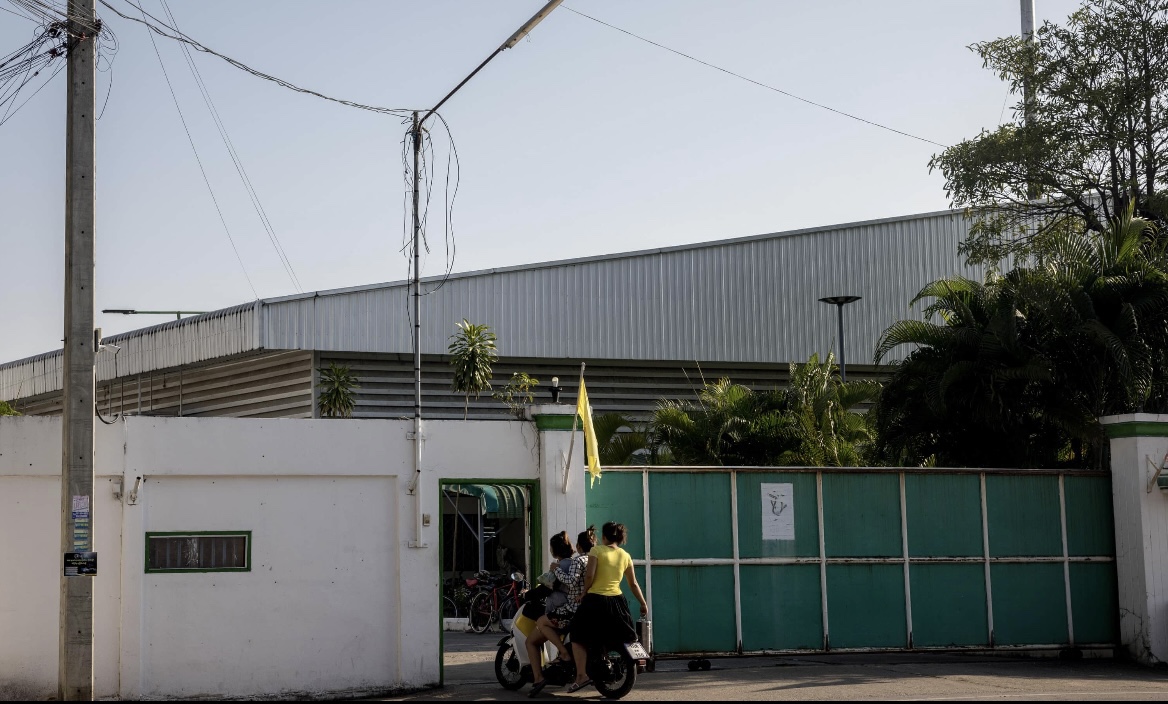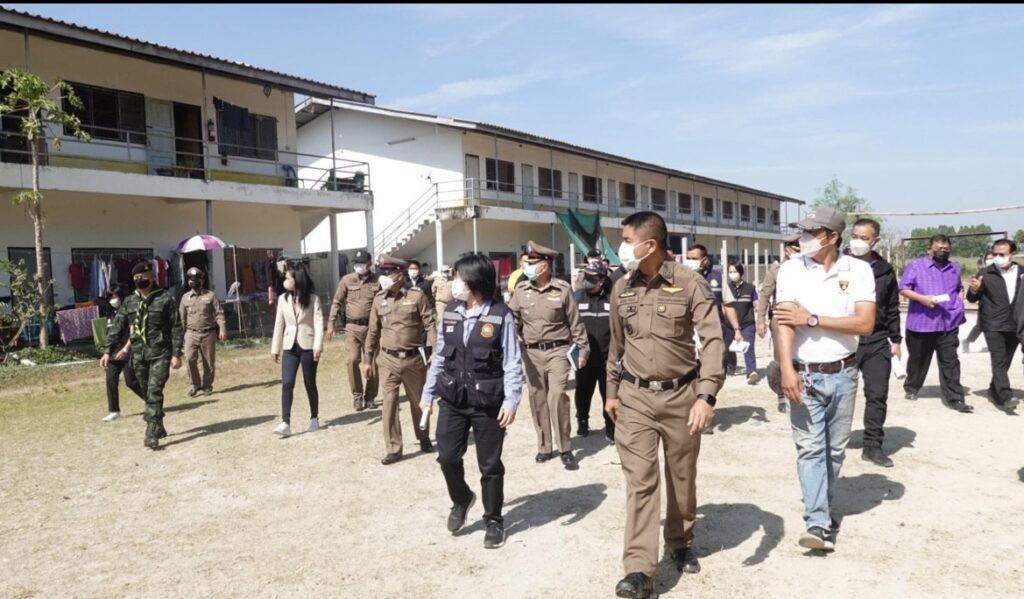Thai police investigate forced labour claims at former Tesco supplier over forced labour claims
Original Article Available – The Gaurdian – By Emily Dugan
Thai police and civil servants have begun screening more than 100 former workers at a factory that supplied Tesco to determine if they were victims of forced labour.
The Guardian revealed last week that Burmese workers who produced F&F jeans for Tesco in Thailand had reported being trapped in their work, enduring 99-hour weeks for illegally low pay in appalling conditions.
Thailand’s department of labour protection and welfare conducted interviews with former workers at VK Garment factory (VKG) on Wednesday, alongside police at an immigration building in Mae Sot. Police said the interviews were due to continue on Thursday.
The move follows a raid by Thai police at the factory last week, less than 48 hours after the Guardian published its first article alleging sweatshop conditions.
Tesco faces a landmark lawsuit in the UK from 130 former VKG workers and a seven-year-old girl, who was raped in accommodation within the factory compound while her mother worked late making F+F clothes. They are suing Tesco for negligence and unjust enrichment and say they were paid as little as £3 a day to work until 11pm with just one day off a month.
The workers made F&F jeans and other clothes for the Thai branch of Tesco’s business between 2017 and 2020. Tesco, which had no role in the day-to-day running of the factory, said the allegations were “incredibly serious” and that it would have ended its relationship with the supplier “immediately” if it had identified issues of the kind at the time.
Oliver Holland, a solicitor leading the case at the law firm Leigh Day, said: “We are aware that the Thai authorities are today investigating the VK Garments factory used by Tesco to make F&F clothing, including interviewing over 100 of our clients to find out whether forced labour was occurring at the factory.
“Our clients allege that they experienced issues such as retention of identity documents, retention of wages, lack of freedom of movement, intimidation, threats, physical and sexual violence. These all fall under the International Labour Organization’s (“ILO”) indicators of forced labour.”
He added: “While it is positive that some action is now being taken, we do not believe that an investigation conducted more than two years since our clients worked at the factory can be a thorough investigation. It is illustrative of the lack of protection that is afforded to Burmese migrant workers in Thailand, who find it almost impossible to achieve justice in Thailand.”
The same workers have also been seeking justice in the Thai courts after being dismissed from the factory in 2020. They say they were dismissed after they confronted the factory about pay and conditions and asked to be paid the minimum wage.
The Thai labour court ruled in September that they were only entitled to severance pay and notice pay but an appeal was lodged in December reiterating their case for the payment of unpaid overtime, holidays and illegally low wages.
Phyo Phyo Mar, a former line leader at VKG, was one of 21 former workers who spoke to the Guardian about conditions. She was interviewed by officials on Wednesday but said the authorities’ approach to their case so far did not fill her with confidence that the case could be resolved using the Thai justice system.
“I feel as if they turned blind eyes to us,” she said, “because of this experience, I don’t have much hope.”
Roisai Wongsuban, of the charity Freedom Fund, which has been supporting the workers, said: “I am glad to see that the Thai authorities took action to screen for forced labour and trafficking victims. Irrespective of the case, the screening should have been conducted in 2020, when workers filed the complaint and shared details of labour violations and human rights abuse with the labour inspector.
A Tesco spokesperson said: “Protecting the rights of everyone working in our supply chain is absolutely essential to how we do business. In order to uphold our stringent human rights standards, we have a robust auditing process in place across our supply chain and the communities where we operate.
“We understand the Thai labour court has awarded compensation to those involved, and we would continue to urge the supplier to reimburse employees for any wages they’re owed.”
Sirikul Tatiyawongpaibul, the managing director of VKG, did not comment on the latest interviews but previously said nothing illegal had been found at the factory.
“We have provided safe working conditions to all employees,” she said. “We are regularly audited by independent auditors who are not affiliated with the company to maintain good working conditions for our employees and as required by law.”
Tatiyawongpaibul has disputed reports in the Guardian about her factory, calling them “hearsay”. She said the claims should be presented in court and could not be commented on, given the pending appeal in Thailand.
(23rd Dec 2022, Guardian) Thai police raid former Tesco clothing supplier at centre of sweatshop claims
https://www.theguardian.com/business/2022/dec/23/thai-police-raid-former-tesco-clothing-supplier-centre-sweatshop-claims
VK Garment factory in Mae Sot is subject of a UK lawsuit against the supermarket from 130 ex-workers

Thai police have raided a clothing factory previously used by Tesco that is the subject of a UK lawsuit over alleged sweatshop conditions.
The Guardian revealed earlier this week that Burmese workers who produced F&F jeans for Tesco in Thailand reported being trapped in, in effect, forced labour, working 99-hour weeks for illegally low pay in appalling conditions.
Thailand’s deputy national police chief, Gen Surachet Hakparn, personally led a raid at the VK Garment factory (VKG) in Mae Sot on Tuesday. With a team of senior police and labour officials, they checked VKG’s working conditions and interviewed workers.
Tesco faces a landmark lawsuit in the UK from 130 former VKG workers and a seven-year-old girl, who was raped in factory accommodation while her mother worked through the evening making F+F clothes. They are suing Tesco for alleged negligence and unjust enrichment.
The workers in the lawsuit made jeans and other F&F clothes for adults and children for the Thai branch of Tesco’s business between 2017 and 2020. Tesco, which was not involved in the day-to-day running of the factory, said the allegations were “incredibly serious” and that it would “have ended our relationship with this supplier immediately” had it “identified [the] issues”.
Surachet said in a statement: “Once I learned about the incident, I immediately contacted the department of labour and welfare to inspect the factory. I had a tour of the factory site, worker accommodation and interviewed workers. I found that the company has an issue with wage payment to the workers and that the case is still in process with the labour court.”
The police and the department of labour protection and welfare officials plan to interview more than 130 former workers at the factory.
Somchai Homlaor, the head of Thailand’s Human Rights and Development Foundation, said the Guardian’s report had attracted “big attention from government authorities”. He added that, while the police attention could prove helpful to former workers, “I don’t think that in the long term this issue will be solved systematically”.
Former workers at VKG described the factory opening puppet bank accounts for them, to make it appear they were paid the minimum wage, while paying much less in cash. Some said their immigration documents were held by the factory.
Workers described being paid as little as £3 a day to work until 11pm with just one day off a month, and said they toiled through the night at least once a month for large F&F orders. Some also reported serious injuries that they said happened while working in unsafe conditions at the factory.
Oliver Holland, the solicitor at Leigh Day leading the UK case against Tesco, said the police raid “illustrates how important it is that there is international spotlight on the case. Our clients’ allegations of forced labour have been the subject of Thai proceedings since 2020, yet it is only now that there is a response from the authorities.”
An appeal was launched last week in Thailand by the same workers after the Thai labour court ruled they were only entitled to the payment of severance pay and notice pay from the factory after being dismissed in 2020.
Thai labour experts say the country’s courts are notoriously ineffective at securing compensation for workers, even in the rare cases where they do win.
Brahm Press, the director of the MAP Foundation NGO, said: “Big brands are still, with impunity, sourcing from factories in this area where it is an open secret that they make money by underpaying their vulnerable workforce of migrants from Myanmar. Someone needs to be held accountable and pay these workers their rightful wages. In a supply chain, doesn’t that lead to the brands?”
A Tesco spokesperson said: “Protecting the rights of everyone working in our supply chain is absolutely essential to how we do business. In order to uphold our stringent human rights standards, we have a robust auditing process in place across our supply chain and the communities where we operate.
“We understand the Thai labour court has awarded compensation to those involved, and we would continue to urge the supplier to reimburse employees for any wages they’re owed.”
Sirikul Tatiyawongpaibul, the managing director of VKG, confirmed that the inspection happened on the afternoon of 20 December, with several senior officers attending. She said they found nothing illegal, adding: “We have provided safe working conditions to all employees. We are regularly audited by independent auditors who are not affiliated with the company to maintain good working conditions for our employees and as required by law.”
Tatiyawongpaibul disputed the previous reports in the Guardian, calling them “hearsay”. She said they should be presented in court and could not be commented on, given a pending appeal in the Thai labour courts.
She also said the accommodation in the factory compound was provided by a third party.
See four additional stories by the Guardian on this issue as background:
1. What do you mean, day off? Workers tell of sweatshop conditions at Thai factory used by Tesco, as supermarket says it knew nothing of claims about VKG (18th Dec 2022, Guardian).
2. Girl, 7, raped at Thai factory supplying clothes for Tesco while mother worked – Exclusive: Woman recounts 2018 attack as landmark lawsuit is brought against retailer on behalf of 130 Burmese former workers (19th Dec 2022, Guardian).
3. Analysis: How big brands like Tesco are drawn to ‘wild west of global supply chain’ – In the Thai city of Mae Sot, where wages and labour conditions are substandard, factories can keep costs low (19th Dec 2022, Guardian).
4. Workers in Thailand who made F&F jeans for Tesco in audited factory ‘trapped in effective forced labour’ (18th Dec 2022, Guardian).


